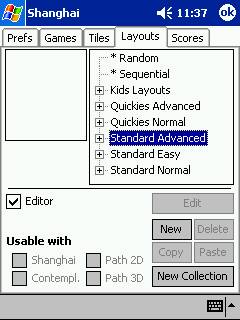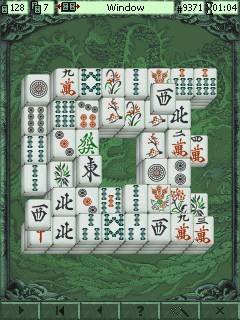|
|
Chris De Herrera's Windows CE Website |
|---|---|
About |
|
| By Chris De Herrera Copyright 1998-2007 All Rights Reserved A member of the Talksites Family of Websites Windows and
Windows CE are trademarks of
Microsoft All Trademarks are owned |
Shanghai Pocket
Essentials Review
By Allen
Gall, Copyright 2002
Revised 2/25/2002
[an error occurred while processing this directive]
Mahjongg, along with the various Tetris, Bejeweled, and Solitaire clones is one of those games that keeps showing up on the Pocket PC. From the no-frills version included in the various incarnations of Microsoft's game packs to polished titles like Ooopdreams' Pocket Mahjongg, the game has been a mainstay on the Pocket PC much like it has on the desktop.
It should be pointed out that electronic versions of mahjongg, which are basically tile matching games, have little to do with the game's namesake. Anyone who's read The Joy Luck Club or played a "real life" version of the game knows that traditional Mahjongg is a sophisticated and challenging test of skill and strategy with similarities to the card game bridge. Such a game would be difficult enough to replicate on a desktop, let alone a handheld, and the primary appeal of electronic mahjongg games is that they provide a light but amusing diversion and don't require a lot of brainpower.
So do we really need another Mahjongg game? Has the genre been exhausted? Recently Landware released Shanghai Pocket Essentials, an officially-licensed port of Activision's Shanghai Mahjongg series on the desktop. With this release, Landware has managed to create a solid and appealing Mahjongg game with a surprising amount of features and expansion options. The game has so much to offer, in fact, that it will likely be the definitive Pocket PC mahjongg game for the foreseeable future.
The Need for Innovation
Most Mahjongg games play effectively the same-you simply tap matching pairs of tiles to remove them from the board. The better you are, the fewer tiles will remain. What makes a mahjongg game good or bad is the amount of features it includes to enhance game play. In order to keep the tile matching fun, the game needs to have some built in variety and flexibility.
Simply put, Shanghai has the most features I've ever seen in this type of game. For starters, the game's configuration menu consists of five screens, with a "tab" for each area. In addition to the usual sound and animation options, you can select from 3 different play modes: "Shanghai," "Path," and "Contemplation." "Shanghai" mode is classic Mahjongg; you match pairs from tiles that are free to slide either left or right. "Path" mode allows you to remove pairs that can be connected by a line with two or fewer turns (in "Path 3D" mode, lines must also be on the same level). I've only seen this variation on the mahjongg theme in one other game whose name escapes me and which I believe is no longer available. You'll also find a unique "Contemplation" mode in which the tiles are face down and need to be turned over to remove pairs.

With all these options, Shanghai Pocket Essentials will keep
mahjongg fans entertained four hundreds of hours.
The game has three basic tile sets, "Japanese" (the traditional tile set), "Math," (for those who like solving equations), and "Samurai," another Japanese-themed set. I won't go through all the tile layouts, since there are simply too many (100!). Suffice it to say that they are varied in both style and difficulty and should be more than enough to satisfy most players. Since they're categorized, you can easily select which ones suit your fancy. The built-in editor allows you create you own tile sets and select which play modes they can be used in. You can have the game progress through each set of tiles randomly or in a sequence. Since each game is numbered, you can go back and replay a level. High scores are saved.
Looking Good, Playing Great
Graphically, the game is outstanding. Each tile is fairly large and rendered in 3D with beveled edges and a nice shadowing effect. When you tap on a pair of matched tiles, you'll be treated to a nice animation that causes both tiles to "fly" off the screen in opposite directions. You can disable this feature if you find it annoying. The backgrounds are also well-drawn and matched to each tile set, although a few are a little hard to see on my iPaq 3835 because of the high level of contrast. No matter what layout you play in, the tiles look far better than the blocky squares found in most mahjongg games.

Graphically, Shanghai beats all other mahjongg games by a mile.
A great deal of thought went into game play. A small information bar at the top of the screen tells you everything you need to know: the number of tiles left, the number of matches left, the title of your current layout, the number of the game you're playing, and the time you've been playing. If you're confused, you can simply tap on one of the numbers and a descriptive "tag" will pop up telling you what that number means. Tucked away at the bottom of the screen are the actual game controls: a "play" button which starts a new game (random or sequentially, depending on your settings), a "rewind" button which allows you to replay the entire board of shuffle the remaining pieces (very helpful if you get stuck or run out of matches!), a "back" button which undoes your current move, a "question mark" which gives you a hint on the next pair of matching tiles, a "magic wand," which brings up the game's options screen, and, finally, an "x," which exits the program. A well-written help screen is also available at the game's intro screen.
Shanghai Pocket Essentials has pretty much everything you'd want in a mahjongg game. The only features I would want to see added would be the ability to change the background because of the aforementioned contrast issue on my iPaq. You'll find enough levels, tile sets, and tile layouts to keep the game interesting for quite a while, and the graphics will keep you coming back for more. The only other game that comes close is Pocket Mahjongg. If you want a flexible, playable, and expandable Mahjongg game, Shanghai Pocket Essentials is all you need.
Shanghai Pocket Essentials is available for $19.95 at Landware's Web site ( www.landware.com ) as well as all the major Pocket PC software distribution points. A 14-day demo is available, and purchasers of the game are also entitled to download a free bonus pack, which includes background music and seven new tile layouts.
Allen Gall is a freelance game reviewer and the games editor for CEWindows.NET. If you have a game you'd like Allen to review, you can e-mail him at [email protected]
[an error occurred while processing this directive]


